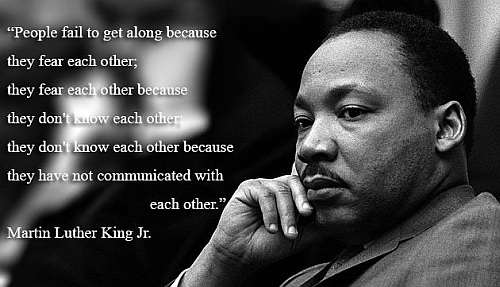The first thing that we notice about another person, but the last thing that we mention....
 t’s easy to be shocked and surprised that Brexit happened and the resulting rise in reported hate crime. But are we really surprised; did we not realise there are people with xenophobic thoughts who now feel at liberty to act these out? In our hearts we know they have been there all along, it’s just that we don’t talk about it. Even those of us who might be the subject of racism prefer not to acknowledge it. Why do we seem so uncomfortable to talk about race? Is it because we can’t actually be honest about the things we don’t know, the things we think we know and the things we really want to know about people who are different from us?
t’s easy to be shocked and surprised that Brexit happened and the resulting rise in reported hate crime. But are we really surprised; did we not realise there are people with xenophobic thoughts who now feel at liberty to act these out? In our hearts we know they have been there all along, it’s just that we don’t talk about it. Even those of us who might be the subject of racism prefer not to acknowledge it. Why do we seem so uncomfortable to talk about race? Is it because we can’t actually be honest about the things we don’t know, the things we think we know and the things we really want to know about people who are different from us?
Research tells us that race is the first thing that we notice about another person, but it is the last thing that we mention. Ever heard ‘I don’t see colour’? How honest is that? It’s like saying I don’t notice that you have blond hair or that you are tall or short. We can’t be open and honest about race because to have an honest conversation there needs to be an element of trust. We need to feel that we are not going to be judged for the questions we want to ask or the answers that we want to give.
Some people are exasperated because they feel they’re going to get jumped on by someone for saying the wrong thing. Sat on a train I overheard a white woman telling her friend that a child had told her off for using the word ‘black’. She turned to her friend and said “It’s just a word; it’s a colour; you just can’t get it right; apparently I’m a racist”. No one likes to be called a racist.
So why can’t we have the conversation; why can’t we use the word ‘black’? The reality is that our ‘in groups’ are not diverse enough, so we end up having the conversation with people like ourselves. This is unlikely to take us any further forward because we don’t hear a different voice. A voice with a different experience. In London, one of the most diverse cities in the world, studies show we are less likely to have interactions with people who are ethnically different from ourselves compared with those who live outside London (How Integrated is Modern Britain, Social Integration Commission Report) and older and younger people are less likely to be ethnically integrated than any other age groups. Shall I mention here the emergence of very conscious bias on social media? Ask yourself the question, Those who are nearest and dearest to me at work or home, what do they look like, where do they live, what sort of work do they do? Chances are they are very like you.
At work and in the media we would rather talk about gender than race. This at a time when it is reported that 25% of professional Black, Asian and Minority Ethnic (BAME) women in the UK change their names to something more English to help them get an interview. Why is it that the diversity of women is not recognised – we really are not all the same, women from ethnic minorities clearly have a very different experience in the career market from their white counterparts. The same is true for men who may be disabled or gay. Nearly 70% of workers think it is unprofessional to discuss LGBT (lesbian, gay, bisexual and transgender) issues; however two thirds of LGBT people have heard ‘gay jokes’ in the workplace. ( Deena Fidas and Liz Cooper, The Cost of the Closet and the Rewards of Inclusion: Why the Workplace Environment for LGBT People Matters to Employees, Human Rights Campaign (May 2015): p. 23)
So why can we talk about gender but not race? I have heard more than once, that if we fix the gender issue then all the other diversity issues will automatically be solved. It is unlikely that this will happen – or it will only happen for straight white women who don’t have a disability because just talking about gender won’t impact on all those women who have to change their names to get their foot in the door. If we really want to see a change, we have to make the effort to get to understand people who are different from ourselves. That means that we need to build trust, we need to be willing to take the risk of getting it wrong before we get it right. We must be willing to listen and hear a different experience.
Martin Luther King said “people fail to get along because they fear each other; they fear each other because they don’t know each other; they don’t know each other because they have not communicated with each other.”
We need to create cultures based on trust whether in the office or in our communities where we can start to have honest conversations about who we really are and how that affects us all. Business and society is based on relationships and positive relationships are based on trust. There are many things that employers can do to ensure that the standard of behaviours that they set is one where trust is fundamental and honest conversations are part of the culture.

Freeman Kulbir Shergill
email: info@bentonandshergill.com, you can also visit our website : www.bentonandshergill.com.